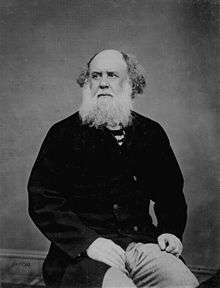Frederick Wright-Bruce

Sir Frederick (William Adolphus) Wright-Bruce, GCB (14 April 1814 – 19 September 1867) was a British diplomat.
Frederick Bruce was the youngest of the three sons of Thomas Bruce, 7th Earl of Elgin and his second wife Elizabeth, youngest daughter of James Townshend Oswald of Dunnikier, Fife. He was born at Bromhall, Fife, on 14 April 1814. On 9 February 1842 he was attached to Lord Ashburton's mission to Washington, returning to England with his lordship in September of that year.
On 9 February 1844 he was appointed colonial secretary at Hong Kong,[1] which place he held until 1846, when on 27 June he became lieutenant-governor of Newfoundland.[2] His next change was to Sucre, with the appointment of consul-general in the republic of Bolivia on 23 July 1847,[3] and on 14 April 1848 he was accredited as chargé d'affaires. He was named chargé d'affaires to the Oriental republic of Uruguay on 29 August 1851,[4] and on 3 August 1853 became agent and consul-general in Egypt in the place of the Hon. C. A. Murray.[5]
On his brother, Lord Elgin, being appointed ambassador extraordinary to China, he accompanied him as principal secretary in April 1857. He brought home (18 September 1857) the treaty with China signed at Tientsin on 26 June 1858 and was made a C.B. on 28 September.
His diplomatic tact was thoroughly appreciated by the home government, for he was appointed on 2 December 1858 envoy extraordinary and minister plenipotentiary to the Xianfeng Emperor of China,[6] and on 1 March following chief superintendent of British trade in that country. His mission was prevented from proceeding to Peking by the opposition made by the Chinese. The mission therefore returned to Shanghai, where it remained until the ratification of the treaty of 26 June 1858 at Peking on 24 October 1860. He proceeded to Peking on 7 November 1860 but withdrew to Tientsin for the winter, while arrangements were made for putting a residence in order for his reception. The mission was established at Peking on 26 March 1861, but it was not until 2 April that Bruce paid a visit to Prince Gong.
On the removal of Lord Lyons from Washington to Constantinople, Bruce was selected to fill the important office of British representative at Washington on 1 March 1865.[7] He was made a K.C.B. of the civil division on 12 December 1862 and received the grand cross of the order on 17 March 1865. He was appointed umpire by the commission named under the convention of 1864, concluded between the United States of America and the United States of Colombia, for the adjustment of claims of American citizens against the Colombian government.
He died, unmarried, at Boston in the United States on 19 September 1867, when his remains were embalmed and, being conveyed to Scotland, were interred at Dunfermline Abbey on 8 October.
Notes
- ↑ The London Gazette: no. 20315. p. 442. 9 February 1844. Retrieved 27 June 2009.
- ↑ The London Gazette: no. 20488. p. 2105. 30 June 1846. Retrieved 27 June 2009.
- ↑ The London Gazette: no. 20757. p. 2690. 23 July 1847. Retrieved 27 June 2009.
- ↑ The London Gazette: no. 21245. p. 2360. 16 September 1851. Retrieved 27 June 2009.
- ↑ The London Gazette: no. 21467. p. 2252. 16 August 1853. Retrieved 26 June 2009.
- ↑ The London Gazette: no. 22219. p. 127. 14 January 1859. Retrieved 27 June 2009.
- ↑ The London Gazette: no. 22945. p. 1324. 3 March 1865. Retrieved 21 June 2008.
References
- Boase, G. C.; rev. H. C. G. Matthew (September 2004). "Frederick Wright-Bruce" (subscription required). Oxford Dictionary of National Biography. Oxford University Press. doi:10.1093/ref:odnb/3730. Retrieved 27 June 2009.
- "The Hon. Sir F. Bruce, G.C.B.". The Gentleman's Magazine and Historical Review IV (223): 677–678. July–December 1867. Retrieved 27 June 2009.
- Attribution
![]() This article incorporates text from a publication now in the public domain: "Bruce, Frederick William Adolphus". Dictionary of National Biography. London: Smith, Elder & Co. 1885–1900.
This article incorporates text from a publication now in the public domain: "Bruce, Frederick William Adolphus". Dictionary of National Biography. London: Smith, Elder & Co. 1885–1900.
| Wikimedia Commons has media related to Frederick Wright-Bruce. |
| Government offices | ||
|---|---|---|
| Preceded by John Robert Morrison |
Colonial Secretary of Hong Kong 1844–1846 |
Succeeded by William Caine |
| Diplomatic posts | ||
| Preceded by William Pitt Adams |
UK Chargé d'Affaires and Consul-General to Bolivia 1847–1851 |
Succeeded by John Augustus Lloyd |
| Preceded by Robert Gore |
UK Chargé d'Affaires and Consul-General to Uruguay 1851–1853 |
Succeeded by George John Robert Gordon |
| Preceded by Charles Augustus Murray |
UK Agent and Consul-General in Egypt 1853–1859 |
Succeeded by Robert Colquhoun |
| Preceded by James Bruce, 8th Earl of Elgin |
UK Envoy Extraordinary and Minister Plenipotentiary to China 1859–1865 |
Succeeded by Sir Rutherford Alcock |
| Preceded by Richard Lyons, 2nd Baron Lyons |
UK Envoy Extraordinary and Minister Plenipotentiary to the United States 1865–1867 |
Succeeded by Sir Edward Thornton |